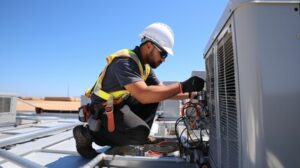A hvac system is a complex network of interrelated systems that keeps indoor air clean, fresh and at an optimal temperature. It also removes excess humidity and contaminates. These systems are crucial to a healthy and comfortable lifestyle.

Regular maintenance is essential to HVAC systems. This includes replacing air filters every 2-3 months and keeping outdoor units clear of debris. It is also recommended to use refrigerants that do not harm the environment. Contact Ausco Air Heating & Air Conditioning for professional help.
HVAC systems consume a lot of energy to run, so making them more efficient is a good way to reduce energy costs. This also helps lower carbon emissions, which is important in an eco-aware society. Energy efficiency also contributes to the comfort of building occupants, and can boost productivity in workplaces.
A variety of factors determine an HVAC system’s energy-efficiency rating, including climate and geography. The system’s EER and SEER ratings are like a snapshot of its performance under specific conditions, and the higher the ratings, the more energy-efficient it is. Some newer models use variable speed motors to make air flow more consistent, reducing hot or cold spots in rooms and increasing comfort.
Energy-efficient HVAC systems are also less expensive to operate than traditional units. This is because they require less energy to perform their tasks, which decreases the demand on power plants. These plants use limited natural resources and produce pollution, which can be reduced by consuming less energy. In addition, energy-efficient systems often qualify for rebates and homeowner tax credits, which can offset some upfront costs.
Another benefit of an efficient HVAC system is that it reduces indoor air pollution. Older HVAC equipment produces a lot of pollutants, but newer models have improved filtration and air purification systems to remove indoor contaminants. Additionally, newer systems are quieter than older units, which can reduce noise pollution in a home or business.
An efficient HVAC system also reduces a building’s cooling and heating loads. It does this by using energy-efficient heat pumps, which combine fossil fuels and renewable energy sources. This type of system is popular among homeowners because it uses fossil fuels but significantly reduces energy consumption.
An efficient HVAC system can improve a building’s resale value and increase its appeal to buyers. Moreover, it can increase the quality of the indoor environment and decrease energy bills. In the long term, it can also reduce maintenance and repair costs. Furthermore, it can also save the environment by reducing greenhouse gas emissions and waste. This is especially important for large commercial buildings, which have high energy usage.
Eco-friendly
The demand for eco-friendly products is growing, and the HVAC industry is responding with innovative sustainable technology. These new technologies help reduce energy consumption and carbon emissions, making them a smart choice for businesses and homeowners. They can also increase the efficiency of existing systems and provide long-term savings on utility bills. In addition, many governments offer incentives, rebates, and tax credits to make these appliances more affordable.
The main challenge of eco-friendly HVAC systems is the initial cost. This is because the equipment uses alternative fuel sources, which often have a higher upfront price tag than traditional heating and cooling options. However, the long-term savings on energy bills can offset the initial investment and make these systems more affordable for businesses and homeowners. Moreover, many eco-friendly HVAC systems are compatible with renewable energy solutions, which can further lower installation costs and energy usage.
A green HVAC system also requires less maintenance than traditional systems, and can save a lot of money in the long run. They are also made with non-toxic refrigerants that do not pollute the Ozone layer, unlike some conventional systems. They also use advanced filtration and ventilation technologies to promote air quality and comfort. Additionally, they can help businesses comply with local and national environmental regulations.
Using renewable energy to power HVAC systems can also cut down on utility bills and carbon emissions. Solar energy, for example, can be used to directly power HVAC systems or supplement power needs. Wind energy can also be harnessed to reduce reliance on fossil fuels and cut costs and emissions. In addition, HVAC systems can be fitted with demand response systems that adjust consumption based on supply availability.
Homeowners can take a number of steps to go green, from installing LED light bulbs to changing the furnace filter. However, the most effective way to reduce a household’s carbon footprint is to invest in an eco-friendly HVAC system. Choosing an environmentally friendly system can reduce your energy bill by up to 30 percent and reduce harmful greenhouse gas emissions. Besides, it can boost your home’s value and make it more appealing to buyers.
Reliable
If you’re considering purchasing a new HVAC system, it’s important to choose a brand with a strong reputation for reliability. This reputation is essential for building brand trust, which cultivates customer loyalty. A reliable HVAC company will also have a solid business model and dedicated office space, which is an indication that they will be around for years to come.
A HVAC system is a complex piece of equipment that must be properly sized, installed, and started up before it can operate at its peak performance. In addition, it must be regularly maintained to ensure the best results. A reliable HVAC company will offer a labor warranty to protect against unexpected repairs. They will also provide detailed and honest estimates, so you know exactly what to expect.
It’s important to look for a company with a good track record in the area, as well as a solid online presence. This will help you make an informed decision about which company to hire for your project. It’s also important to consider the size of the company, as a small company may be more likely to cut corners in order to save money.
In addition to a great reputation, it’s important to choose a company with high quality products and reputable partnerships. A trustworthy HVAC company will offer quality parts and components from reputable manufacturers that are backed by a long-term warranty. It’s also worth noting that HVAC companies that sell and install their own products tend to have better warranties than those that simply service other brands.
If you’re looking for a new HVAC system, there are many brands to choose from. For example, York and Heil are two of the most popular manufacturers in the industry. The former offers a wide range of heating and cooling systems, including packaged units, mini-splits, and gas furnaces. The latter, on the other hand, is known for its innovative technology and energy-efficient products. However, its quality control issues have been a source of concern among consumers. These issues have led to complaints and negative reviews, which may negatively affect its reputation in the market.
Affordable
HVAC is a system of heating, ventilation and air conditioning that is used to control the temperature and quality of indoor air. These systems are found in residential and commercial structures, including single-family homes, apartment buildings, hotels and senior living facilities. They also serve vehicles, aircraft, ships and submarines. Its purpose is to ensure safe and healthy building conditions by controlling humidity, ventilation, temperature, and oxygen levels in conditioned spaces with fresh air from the outside.
The cost of a new HVAC system can vary widely, depending on several factors. These include the type of HVAC unit you want, the brand, and any add-ons or upgrades you might choose. The price of the system will depend on its efficiency rating as well, which is measured by SEER (Season Energy Efficiency Ratio). The higher the SEER rating, the more money you’ll save each month.
Many HVAC systems are available with long parts-replacement warranties, which can be an excellent way to save money in the long run. These warranties can cover both the cost of repairs and labor, making them a good investment for any homeowner. However, you should be sure to research the warranty options before purchasing a HVAC system. Some vendors only offer their warranties to qualified customers, so it’s important to find one that meets your needs.
The cost of installing a new HVAC system depends on several factors, such as the size of the space and ductwork installation. Ductwork is the most expensive part of a new HVAC system, but it’s worth it in the long run because it can improve the overall air quality of your home.
You should also consider the cost of a new system based on your budget. Some people prefer to buy a smaller, less expensive system, which can be more affordable in the long run. Others prefer to invest in a more expensive system that offers superior energy efficiency.
Another option for reducing the cost of an HVAC system is to purchase it through a home improvement loan. These loans are typically unsecured, quick to be approved and have low interest rates. They are a good option for homeowners who don’t have enough cash on hand to afford the cost of a new system. They are also tax-deductible, which can help offset the expense of a new HVAC system.
